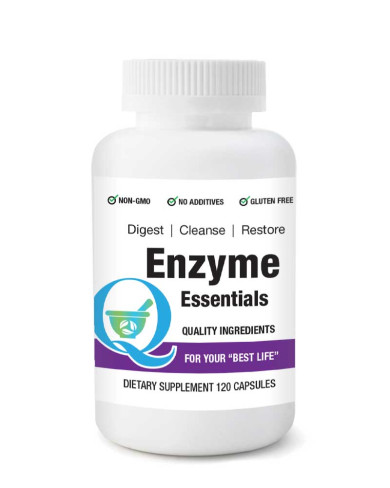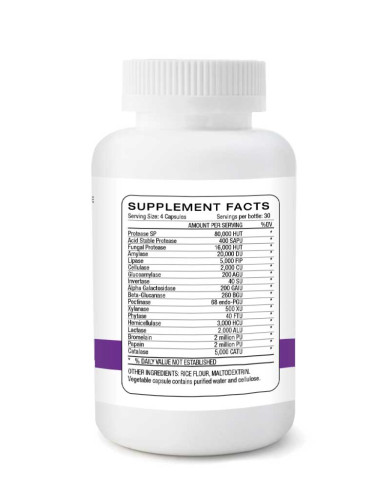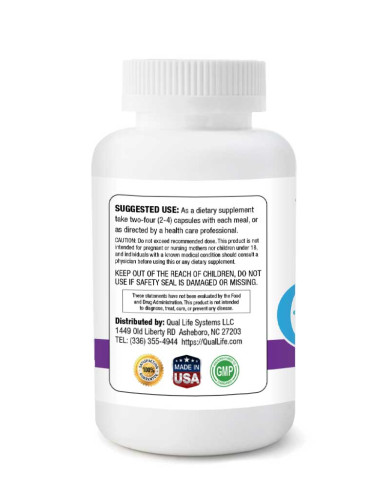Enzyme Essentials
The Role Enzymes Play
Enzymes facilitate countless daily reactions in your body to keep you alive and thriving. They perform many functions. Enzymes catalyze chemical reactions in the body. Virtually every systemic function in the body is dependent on an enzymatic reaction.
Enzymes for digestion - Digestive enzymes specifically work to break down the food you eat.
Everyone produces enzymes naturally, but some don't make enough due to poor diet, chronic conditions, stress, or age. Without enough enzymes, your body can't digest food properly, leading to bloating, gas, constipation, diarrhea, or other "GI" related symptoms.
The enzyme Lipase catalyzes the breakdown of fats (lipids).
Protease enzymes catalyze the breakdown of proteins.
Amylase breaks down carbohydrates, and starches (polysaccharides).
Cellulase refers to a group of enzymes that, acting together, hydrolyze cellulose.
Invertase is an enzyme that catalyzes the hydrolysis (breakdown) of sucrose (table sugar).
Glucoamylase is a different type of amylase. Produced within the human body, it is accountable for breaking off long-chain carbohydrates or starches into sugar that will afterward be used as fuel by the body.
Alpha-galactosidase is a digestive enzyme that breaks down the carbohydrates in beans into simpler sugars to make them easier to digest.
Beta Glucanase is a group of carbohydrate enzymes that break down glycosidic bonds within beta-glucan. Beta-glucans are a polysaccharide made of glucose molecules linked together into long chains that humans cannot readily digest. Such as cellulose plant fiber, cereal bran fiber, and parts of certain types of fungi, yeast, and bacteria.
Pectinase is an enzyme group that breaks down pectin, a structural heteropolysaccharide found in primary plant cell walls of terrestrial plants, and cereals.
Xylanase is a class of enzymes that degrade the linear polysaccharide beta-1,4-xylan into xylose, thus breaking down hemicellulose, one of the major components of plant cell walls.
Phytase is an enzyme that catalyzes the hydrolysis of phytic acid (Myo-inositol hexakisphosphate) – an indigestible, organic form of phosphorus that is found in many plant tissues, especially in grains and oil seeds.
Hemicellulase breaks down hemicellulose. Common fiber-rich breakfast cereals have a large number of hemicelluloses. Hemicellulase is needed to break down these fiber-rich components.
Lactase is essential to the complete digestion of whole milk; it breaks down lactose, a sugar that gives milk its sweetness. Lacking lactase, a person consuming dairy products may experience the symptoms of lactose intolerance.
Bromelain is a protein-digesting enzyme mixture derived from the stem, fruit, and juice of the pineapple plant. Bromelain is also used to reduce inflammation and swelling and for osteoarthritis.
Papain is a proteolytic enzyme extracted from the raw fruit of the papaya plant. Proteolytic enzymes help break proteins down into smaller protein fragments called peptides and amino acids.
Catalase can help protect the body from oxidative damage by breaking hydrogen peroxide into water and hydrogen. If not broken down, peroxides accumulate in the body, and if left unchecked cause DNA damage and inflammation.
*This product is not intended to diagnose, treat, cure, or prevent any disease. Individual results from taking supplements and/or other products mentioned on this site may vary. Before starting a dietary supplement routine, be sure to consult a qualified healthcare professional.
Tags: enzymes, digestive enzymes, systemic enzymes



